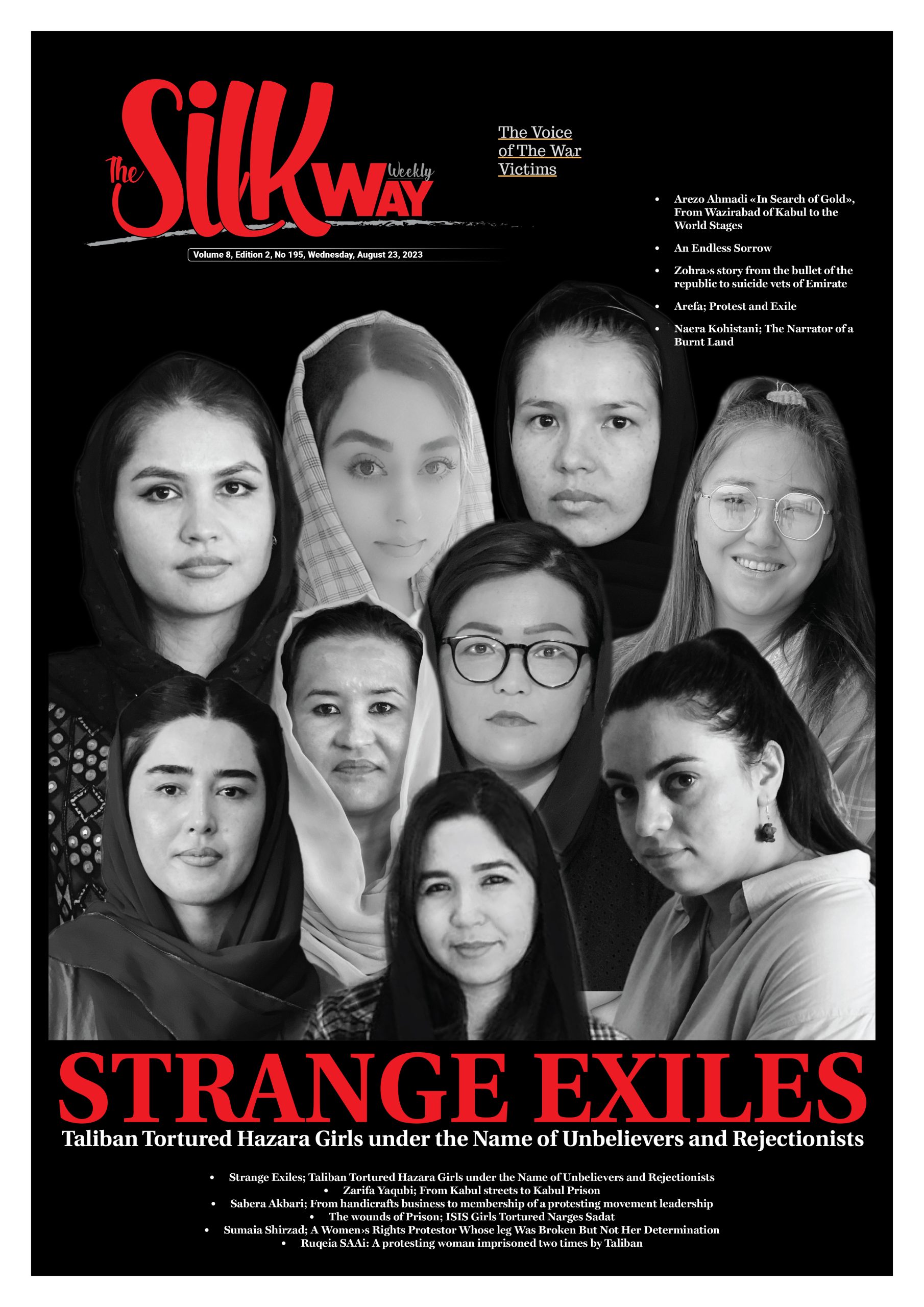 By: Khaliq Ebrahimi
By: Khaliq Ebrahimi
Translated by: Mohammad Rezaie
On Thursday, (November 3, 2022), Zarifa Yaqubi, after having an adventurous day in police district 18, returned to a hotel in Dasht e Barchi where she and her friends wanted to announce Formation of Women Movement for Equality”.
Yaqubi says she had to receive a meeting authorization letter from police district 18 of Kabul. She went there, gave her petition, it was edited for several times, and they told her to wear a proper headscarf, and clothes. Ultimately, she received the permission letter for the the first meeting of “Women Movement for Equality”.
Though she received warning phone calls from police district 18 but she didn’t take them seriously. She was told to cancel the program because the Taliban intelligence was watching her and would arrest her. “When I reached to the hotel, the guests had arrived, and I had to conduct the meeting” Yaqubi says. The movement was inaugurated, the first statement of the movement was read, and the guests were received with tea.
Meanwhile, two Taliban came to the meeting. They told us to put our phones on the ground. We did so. They asked shouting “Who was Zarifa?” They heard “I am”. They found her and made her to stand in a corner of the hotel. Searching the phones was useless. Zarifa and her companions had learnt to take a picture, send it to their friends and then delete it.
 They sent out the guests of the hotel who were mostly the young girls. Taliban hit one of two of them Zarifa objected. They slapped at her face to keep silent. They arrested Zarif and three young boys. Taliban had brought four police women only to arrest Zarfia Yaqubi. They handcuffed her hands and took her with themselves in a separate car.
They sent out the guests of the hotel who were mostly the young girls. Taliban hit one of two of them Zarifa objected. They slapped at her face to keep silent. They arrested Zarif and three young boys. Taliban had brought four police women only to arrest Zarfia Yaqubi. They handcuffed her hands and took her with themselves in a separate car.
It was not the first time that Zarifa was arrested by Taliban. She was arrested some days ago when she was returning from a conference on Slow-Norway meeting in water foundation square and was in the custody of police district 9, Kabul, for one night. The made her to confess and then took a guarantee from her relatives and then was released from the prison. Following this, she didn’t have pen political activities on Kabul streets but was mainly focused on organizing the protests and coordinating them.
She was on the streets even when she was “prohibited” by Taliban. When she was not abled to take part in the protests on streets, she was busy in managing women protests in Kabul. She played an outstanding role in advocating women’s rights and the rights of the minority groups. Taliban watched her everywhere. In Shahre Naw Park, on the street. When she heard there was an attack on Kaaj, she run to hospital to save the lives of the girls. She hoped to donate blood, but Taliban stopped her.
When more women joined them, they said let’s protest. And they protested hoping to open the way for helping those who were injured in Kaaj attack and donate blood for them. But Taliban responded violently. Later on, Zarif Yaqubi and other protesting women were dispersed by Taliban shooting in the air and they just run in the alleys of Kabul to save their lives. Yaqubi couldn’t go home on that day but she came to streets tomorrow. Taliban suppressed their protests harshly. They were suppressed anywhere they had a meeting from Kabul university to downstairs, upstairs and anywhere.
She was not alone in any protest; One of the protesting girls accompanied her. As she was not alone in the first week, she was imprisoned in Taliban’s intelligence prison. Taliban had allowed her younger sister, Atifa, to be with her in prison. But Taliban investigated Atifa too. One of the 4 policewoman who arrested Yaqubi, put a black sack on her head and then took her directly to Taliban intelligence in Kabul. The they brought Atifa as her chaperone. Taliban only allowed Yaqubi to use her mobile phone in order to find someone to guarantee her. Shaikh Madar Ali Karimi, said he was on the way to the Taliban intelligence. “He has not arrived yet and he will never arrive to the Taliban intelligence to guarantee me.” Yaqubi said.
Madar Ali Karimi, a Hazara deputy Minister for the Ministry of Urban Development of Taliban called Zarifa “Nephew”, because he was a close friend of her father, but Madar did not guarantee her. Her case was sent from intelligence of Kabul to Directorate 40. They handcuffed Zarifa to transfer her to Directorate 40. Her sister was very worried but what she could do when Taliban responded any protest violently. They reached to Directorate 40 after one hour and half while it only takes 10 minutes. Yaqubi was very disappointed because her case was official now and she had no hope to be released from the prison.
Three women soldiers accompanied, Yaqbubi and her sister. Two more soldiers came and took them to the second floor of Directorate 40. The rood did not have any window, the chairs in the room were broken and there were two old mattresses.
During the three days they were in the prison of Kabul intelligence, director of intelligence came only one time and offered Yaqubi to release her if she was guaranteed. But in Directorate 40, she was tortured and investigated in groups of 3 nearly every day. Pashtun villagers’ men did not know Persian and they had Persian translators and they played the role of prosecutors and investigators.
Yaqubi had nothing to hide now. Because Taliban had watched her for a long time and now, they had discovered anything about her after searching her cell phone. As a result, when Taliban asked any question, she told the truth She told them about her membership in women’s rights protesting groups and her relations with the political leaders and political groups. During second investigation they asked her. Why did you protest? She replied: Bread, work and freedom. And she sharply said after the Taliban takeover 30 edicts have been issued on limiting women’s basic rights. Yaqubi lost her job after the first edict and she lost all her political and social rights when other edicts were issued. In addition to consecutive investigations, what made Yaqubi more frustrated was the messy condition of the prison. She ought to pay for nearly everything to the prison guards. “Without paying ransom she even could not go to the toilet.” Zarifa and her sisters had 1,000 afs, she gave 500 afs to her siter to go home and paid the remaining 500 to the prison guards in order to restrict her less. After her sister went home, nobody came to meet her. She spent 15 days in prison with only one pair of clothes. Then, they brought her two more pairs and Zarif could not see who had brought them. She did not know no one was allowed to meet her.
She stayed in prison without meeting anyone for 34 days. When she remembered her family and friends, she though she was no more that brave women who was afraid on no one; she had cried for her family and friends. At 10: A.M, a woman prison guard came and told her to wash her hands and face. Because she had a visitor. It looked incredible. “You are not allowed to say even one word about the condition of the prison.” On that day, One of the protesting girls, and her sister Atifa, had come to meet her. They could meet Zarifa due to Fawzai Kofi’s pressures and connections. Kofi had told Taliban if Yaqubi was alive Taliban should allow her family to meet her at least for one time.
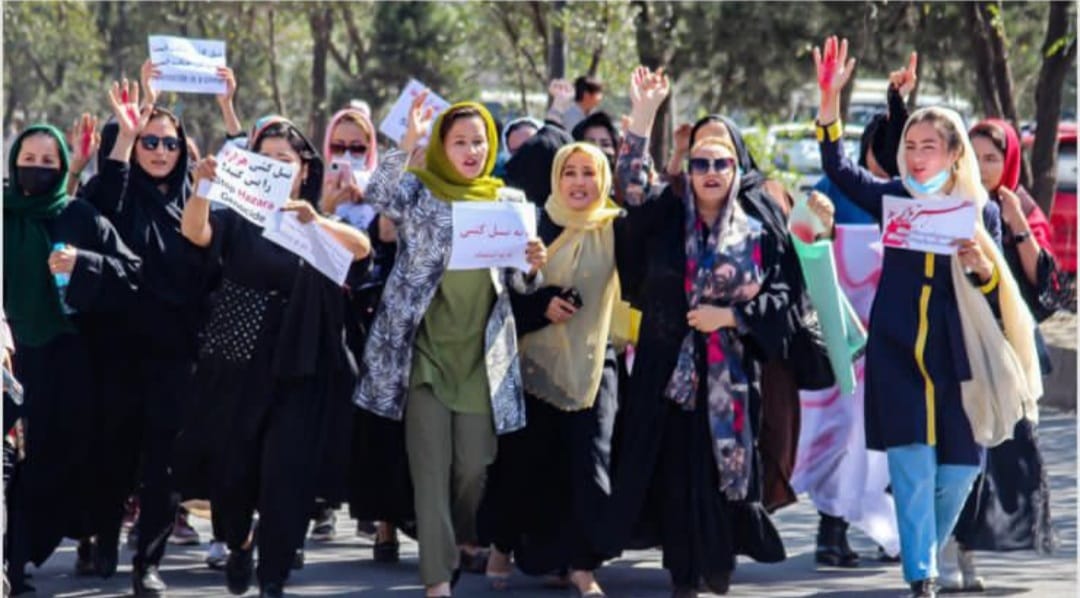 On that day, Yaqubi could not tell them it was 43 days that she had not slept well, had not eaten a good breakfast and her individual cell had been changed 4 times so far. She was imprisoned with 400 women, but she was imprisoned in an individual cell. She also could not tell them she was not able to sleep due to the torture of imprisoned women and their sad screams. She also could not tell them Elah Delawarzai and Farhat Popalzai were imprisoned there too. She also could not tell them the prison was cold and its roof was leaking. She could not tell them the guards even interfered in the way she did her prayers as a Shiite Muslim. Atifa, her sister, told her that she had come several times to meet her but they had not allowed her to meet Zarifa.
On that day, Yaqubi could not tell them it was 43 days that she had not slept well, had not eaten a good breakfast and her individual cell had been changed 4 times so far. She was imprisoned with 400 women, but she was imprisoned in an individual cell. She also could not tell them she was not able to sleep due to the torture of imprisoned women and their sad screams. She also could not tell them Elah Delawarzai and Farhat Popalzai were imprisoned there too. She also could not tell them the prison was cold and its roof was leaking. She could not tell them the guards even interfered in the way she did her prayers as a Shiite Muslim. Atifa, her sister, told her that she had come several times to meet her but they had not allowed her to meet Zarifa.
Four days later, Taliban investigators came at 12: P.M. They handed her a piece of paper; forced confession. Yaqubi resisted to not sign the paper but Taliban threatened her if she did not sign the paper, she would remain in the prison forever. She had no option but to sign the forced confession paper.
Zarif says Taliban poured confusing materials to the prisoner’s food which made them to be confused. They had poured such food stuff in Zarifa’s food for several times and she had confessed while she had been confused. She did not feel well and fell down, and when she was conscious, she found she was in the prison saloon on the stair case of the toilet.
Next day, the manager of women department told her she was released. It was unbelievable. She could see something else than darkness after 40 days. For example, she could see the foggy sky of Kabul. She could see the sunrise and sunset of Kabul. She collected her clothes but they did not allow her to take her diary. She tore the notebook into pieces and threw it away in front of one policewoman and three policemen. After waiting for 7 hours, managers of section 72 and 40 of Taliban came to take new commitments from Yaqubi. “Don’t think you are released and no one watch you out.” And they offered their first suggestion: Work with us and Yaqubi had said indeed!”
Yaqubi was investigated 7 times by different institutions of Taliban. In addition to noting anything one says during the investigation, Taliban had taken two forced confessions of her. One in the prison and the second one in the Shiite Commission. When she was called on from the prison to the Shiite Commission, they took a picture of her and had another confession before the cameras and Shiite Commission members. She noted that she was released based on a Shiite Commission guarantee.
Yaqubi was told she should immediately have a press conference after her release and she should praise good treatment of Taliban authorities with prisoners. But they did not give back her phoner after she was released. The next day, she went along with 10 members of her relatives to the Shiite Commission to complete her guarantee that she would not take part in the protests anymore. She guaranteed she would not go to the streets. When there is a bloody incident like suicide bombing in Kaaj Educational Center, she must not protest or donate blood the people with injuries. She must not protest when Hazara students are expelled in group from Kabul university or they are poisoned. Yaqubi should say Hazara and Shiite people enjoy their ethnic and religious rights under Taliban in order it gives her a position in the Ministry of Foreign Affairs.
Yaqubi has studied political science and has worked more than 10 years with national and international organizations. She was an active member of Mawj Tahawol “The Wave of Change” the only political party of women chaired by Fawzia Kofi. She had struggled against Taliban on streets after the fall of the republic by protesting against the limitations it has imposed on women. Taliban had offered her a position in the MoFA if Yaqubi worked with them. But Taliban did not give back her telephone on the day she was released and created many problems for her reconnect with he contacts. Her psychological and mental health deteriorated after she was released and she needed to go consult with a doctor.
After Yaqubi was detained and imprisoned, Afghan women rights protests was was harmed. After she was released, she was in Kabul for three months, but she was not allowed to have political activities and Kabul streets were silent. One day she called her friends and asked them to take to streets. Taliban had told her not to protest from Barchi against Taliban. She was at home, when she heard her friends had been arrested and she went out to help her sister. When she got off the car in Mahtab Qala she was arrested again.
She was taken to police district 6 of Kabul to remind her how much it costs to stand against Taliban. They remind her of 40 days in prison and how she was tortured and had confessed by force. She was released along with One of the protesting girls after being insulted by Taliban. The Shiite Commission had guaranteed her again. Yaqubi struggled nights and days with herself. She had Spain’s visa but had not left the country and wanted to stay beside the Afghan women and continue Afghan women rights struggles against Taliban. Homeland looked smaller and intolerable by Taliban suppression. Finally, she decided to leave Afghanistan. “I preferred displacement to slavery.” Yaqubi said.


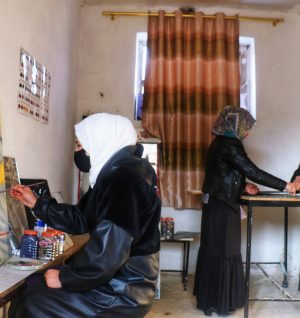
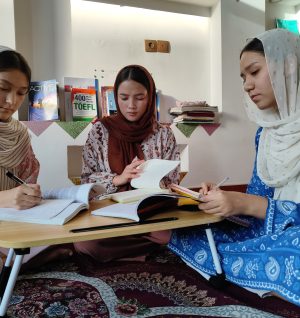
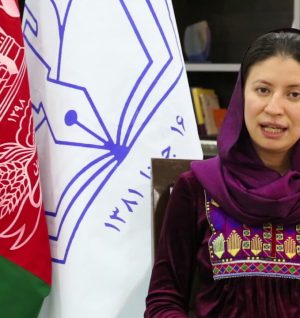
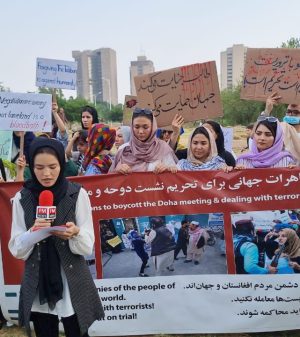
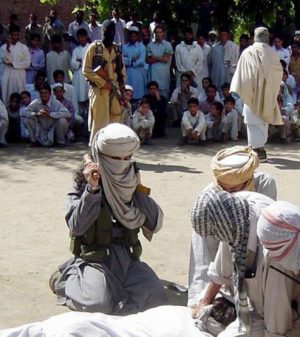
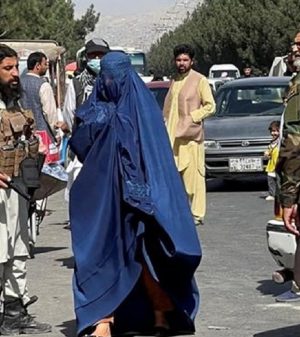
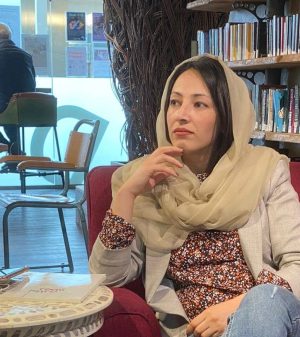
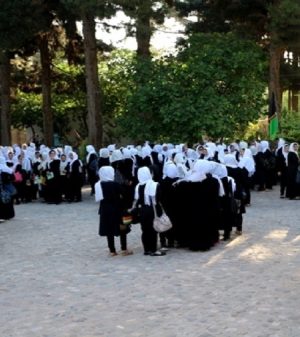
Add Comment